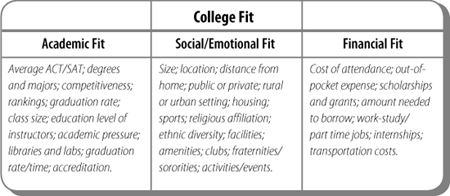Finally, there is
financial preparedness. This goes beyond having your child develop a
budget for living expenses while away at school. Financial preparedness
means both you and your child are on the same page about the financial
implications of college choice. It means that you both clearly
understand how your family will be paying for college.
Financial
preparedness means getting clear in your own mind where you stand on the
issue of paying for college. Is it your expectation that you will pay
for any college, regardless of the cost? Does your child have the same
expectation? Can your child go anywhere she wants, as long as she can
get admitted? This is the “college first” approach, in which a student
selects the college and the parents figure out how to pay for it. Is
this the way you see it? If this is the way your child sees it, are you
two in agreement?
If you are not going to
be able to pay for college, or if you will not be able to pay the full
amount, do you expect your child to borrow money for college? If so, how
much debt are you comfortable with your child taking on to pay for
college? Is the message you are communicating to your child that no
amount of money is too great to borrow to go to certain schools? Is this
the message your child is getting from family, friends, counselors,
teachers, and college recruiters? If so, does your child understand the
long-term implications of the debt she will be taking on?
Because college
recruiters often communicate with students in the high school before
parents are involved, and because recruiters often frame the decision
about where to go to college as a “college first” decision, it is
important to examine your beliefs around college choice and communicate
them clearly to your child before you both get swept up in the emotion
of the college admissions process.
You and your
child will experience heavy marketing around choosing a college. As the
pool of traditional-age students grows smaller in the next few years,
there will be more and more recruiting pressure on your child to
consider different schools. You need to be clear about where you stand.
Talk with your child about how the decision about college will be made
in your family. Will the decision be your child’s alone? Will it be your
decision? Will it be a joint decision, based on the overall financial
situation of the family as well as your child’s best interest, both
academically and financially? This is the “cost first” approach. How
much can you afford to pay for college? Given what you can afford, which
colleges are the best fit for your child?
The College Fit
worksheet will help you organize your thoughts around college fit. Think
about your child’s academic, social, and financial preparedness for
college. Then identify the corresponding information about the colleges
your child is considering. This will give you more data upon which you
and your child can base the college decision.

A student who is
strong both academically and socially and who has unlimited financial
resources might be encouraged to go anywhere. A student who is strong
academically but socially and emotionally tentative might be encouraged
to look at schools closer to home. A college that is a two- to
three-hour drive home for the student to recharge and refocus might be a
better fit than a college with a six-hour plane flight between school
and home. An academically strong student with good social skills but
limited financial resources might look for schools providing the best
scholarship offers, keeping in mind the need to limit student loans to
cover transportation costs and living expenses. A student with good
social skills but weak academic skills who has unlimited financial
resources might look for a private college that offers a strong academic
support program to help her build her skills to the college level and
go on to finish a college degree. An academically weak student who is
also socially weak, even with unlimited resources, might be wise to
attend college close to home until she has demonstrated she is capable
of college-level work.
There is no “one size
fits all” way to choose a college and no one “right” college for every
student. The transition to college is a major developmental milestone,
and not all students are at the same developmental stage when they
graduate from high school. College choice should be made accordingly.
Whatever
decision you and your child make, you will have to come up with the
money to pay for it. Is there a way to identify the true cost of college
before a child enrolls?